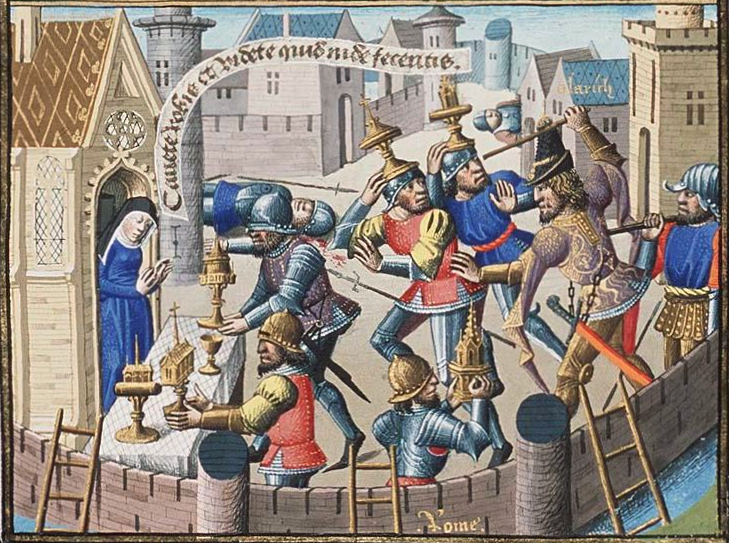The Crimean War (1853-1856) was the first war in which
the home front could follow the outcome of the various battles within days,
thanks to the invention of the telegraph. Modern technology makes it possible
that we can watch a war life on television. Not so in Antiquity: it took two
years before the news of the sacking of Rome by the Goths in 410 reached Saint
Jerome, who was at that time at Bethlehem. It was an utter shock, when slowly
and in bits news about this this disaster reached him. As a theologian he
immediately recalled to mind Isaiah and the Psalms, but Jerome was also deeply
learned in classical literature – his first love which he later so resented –
and he could not help but quote Vergil too.
Saint Jerome, Letter 127, 12
Dum haec aguntur in Iebus, terribilis de Occidente rumor
adfertur, obsideri Romam et auro salutem civium redimi spoliatosque rursum
circumdari ut post substantiam vitam quoque amitterent. Haeret vox et singultus
intercipiunt verba dictantis. Capitur Urbs, quae totum cepit Orbem, immo fame perit
ante quam gladio et vix pauci qui
caperentur, inventi sunt. Ad nefandos cibos erupit esurientium rabies et sua
invicem membra laniarunt, dum mater non parcit lactanti infantiae et recipit
utero, quem paulo ante effuderat. Nocte Moab capta est, nocte cecidit murus eius.
Deus, venerunt gentes in hereditatem tuam, polluerunt templum sanctum tuum,
posuerunt Hierusalem in pomorum custodiam, posuerunt cadavera servorum tuorum escas volatilibus caeli,
carnes sanctorum tuorum bestiis terrae. Effuderunt sanguinem ipsorum sicut
aquam in circuitu Hierusalem et non erat qui sepeliret.
Quis cladem
illlus noctis, quis funera fando
Explicet , aut
possit lacrimis aequare dolorem?
Urbs antiqua
ruit multos dominata per annos,
Plurima perque
vias sparguntur inertia passim
Corpora ,
perque domos et plurima mortis imago.
Iebus: name for
Jerusalem, cf. Jebusites
obsideo obsedi
obsessum: to besiege
redimo redemi
redemptum: to buy (in 408 the besieged Romans tried to buy peace with a
large amount of gold.)
spolio (-are): to rob plunder
rursum: again
substantia:
resources, wealth
haereo haesi:
to stick
singultus -us
(m.): a sobbing
dictantis: for
me dictating this letter
fames famis
(f.): hunger
immo….ante quam:
(The City) has fallen indeed before by hunger rather than by the sword
vix: hardly
qui caperentur:
who could be taken captive
nefandos cibus:
heinous nutriment
erumpo erupi
eruptum: to burst out. (Here used as a vivid and rhetorical description for
what the esurientium rabies (the
madness of the hungry) has led to.)
invicem:
mutually
lanio (-are): to tear in pieces, butcher
parco peperci
parsum (+ dat.): to save, spare
lacto: to suck
milk
infantia:
children (collective use of the singular.)
dum..effuderat:
This rhetoric is far beyond what we would nowadays consider palpable…
recipit (in) utero:
received in her belly
effundo effudi
effusum: to pour out, give girth
Nocte eius: Is.
15, 1
Deus...sepeliret:
Ps. 79, 1-3
Posuerunt custodiam:
They have turned …into an orchard (pomorum custodiam. This translation is
from the Septuagint, which has ὀπωροφυλάκιον. The Hebrew has a different word,
meaning `ruims’.)
esca: food
volatilibus cœli:
for the birds of the sky
circuitus –us (m.):
surrounding
Hierusalem: Hebrew
words are not declined
Quis…imago: Verg.
Aen. II 361-365
clades cladis
(f.): destruction, slaughter
fando: by
speaking
lacrimis aequare
dolorem: i.e. there are not enough tears to equal the pain
urbs: Troy
spargo sparsi
sparsum: to scatter
iners inertis:
motionless
plurima imago:
the manifold image, face

Sack of Rome by Alaric - sacred vessels are brought to a
church for safety. Picture from a French manuscript (1475)
Translation: Nicene
and Post-Nicene Fathers, Second Series, Vol. 6. (1893) (old fashioned, sometimes misleading
and incomplete, but the only available on internet )
12. Whilst these things were happening in Jebus a
dreadful rumour came from the West. Rome had been besieged and its citizens had
been forced to buy their lives with gold. Then thus despoiled they had been
besieged again so as to lose not their substance only but their lives. My voice
sticks in my throat; and, as I dictate, sobs choke my utterance. The City which
had taken the whole world was itself taken; nay more famine was beforehand with
the sword and but few citizens were left to be made captives. In their frenzy
the starving people had recourse to hideous food; and tore each other limb from
limb that they might have flesh to eat. Even the mother did not spare the babe
at her breast. In the night was Moab taken, in the night did her wall fall
down. Isaiah 15:1 O God, the heathen have come into your inheritance; your holy
temple have they defiled; they have made Jerusalem an orchard. The dead bodies
of your servants have they given to be meat unto the fowls of the heaven, the
flesh of your saints unto the beasts of the earth. Their blood have they shed
like water round about Jerusalem; and there was none to bury them.
Who can set forth the carnage of that night?
What tears are equal to its agony?
Of ancient date a sovran city falls;
And lifeless in its streets and houses lie
Unnumbered bodies of its citizens.
In many a ghastly shape does death appear.